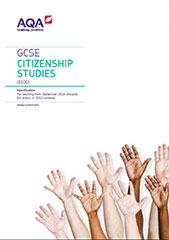3.4 Politics and participation
In this theme students will look at the nature of political power in the UK and the core concepts relating to democracy and government. This includes how government operates at its various levels within the UK, how decisions are made and how the UK parliament works and carries out its functions. It also looks at the role of political parties, the election system, how other countries govern themselves and how the citizen can bring about political change.
Where does political power reside in the UK and how is it controlled?
- The concept of democracy and different forms of democracy, including representative democracy.
- The values underpinning democracy: rights, responsibilities, freedoms, equality, the rule of law.
- The institutions of the British constitution: the power of government, the Prime Minister and cabinet; the sovereignty of Parliament; the roles of the legislature, the opposition, political parties, the Monarch, citizens, the judiciary, the police and the Civil Service.
- How the relationships between the institutions form an uncodified British constitution and examples of how this is changing.
What are the powers of local and devolved government and how can citizens participate?
- The role and structure of elected local government; the services provided by local government for citizens in local communities; roles and accountability of councillors.
- The nature and organisation of regional and devolved government: Scotland, Wales, Northern Ireland and England.
- How powers are organised between the Westminster Parliament and the devolved administrations in Northern Ireland, Scotland and Wales; how relations are changing between England, Scotland, Wales and Northern Ireland; the debate about ‘English votes for English laws’.
- Who can stand for election and how candidates are selected.
- Who can and cannot vote in elections and why; debates about the voting age.
- Issues relating to voter turnout, voter apathy and suggestions for increasing voter turnout at elections.
- How public taxes are raised and spent by government locally and nationally.
- The practice of budgeting and managing risk and how it is used by government to manage complex decisions about the allocation of public funding.
- Different viewpoints and debates about how governments and other service providers make provision for welfare, health, the elderly and education.
Where does political power reside: with the citizen, parliament or government?
- The nature of the 'First Past the Post' system based on parliamentary constituencies; the frequency of Westminster elections.
- Other voting systems used in UK elections, including proportional systems and the advantages and disadvantages of each.
- The difference between the executive, the legislature, the judiciary and the monarchy. The nature of bicameral Westminster parliament, the respective roles of and the relationship between the House of Commons and the House of Lords and the role of the monarch.
- The major political parties contesting UK general elections; key philosophical differences between the political parties operating in UK general elections.
- How parliament works: scrutinising government and making it accountable; parliamentary questions, committees, debates.
- The role of MPs; representing their constituencies, debating policy; scrutinising legislation.
- Ceremonial roles including Black Rod; key parliamentary roles including the Speaker, whips, front bench and back bench MPs.
- The legislative process; parliamentary debates and deliberation of public issues and policy.
- The formation of government by the leader of the political party with a majority in the House of Commons, or by a coalition of parties.
- The role of the Prime Minister, cabinet and ministers; the power of the Prime Minister and cabinet.
- The organisation of government administration into departments, ministries and agencies; role of the civil service.
How do others govern themselves?
Updated
We've updated this section to reflect the Department for Education's (DfE) edit of the subject content following the UK’s departure from the EU.
Key differences in how citizens can or cannot participate in politics in one democratic and one non-democratic political system that is outside the UK.
How can citizens try to bring about political change?
- How citizens can contribute to parliamentary democracy and hold those in power to account.
- How digital democracy, social media and other measures are being developed as a means to improve voter engagement and the political participation of citizens.
- The different forms of action citizens can take to hold those in power to account for their actions; how the citizen can contribute to public life by joining an interest group or political party: standing for election; campaigning; advocacy; lobbying; petitions; joining a demonstration; volunteering.
- The roles played by public institutions, public services, interest and pressure groups, trade unions, charities and voluntary groups in providing a voice and support for different groups in society.
Citizenship skills, processes and methods
Each of the questions that frame the subject content for this section helps establish a question or hypothesis. This will enable students to develop the citizenship skills, processes and methods listed in this specification. Many of the skills, processes and methods listed can also be developed through the use of a case study approach.
